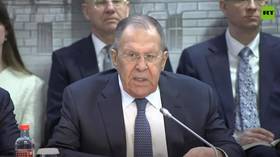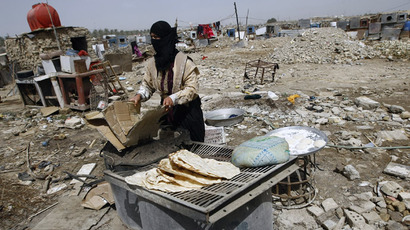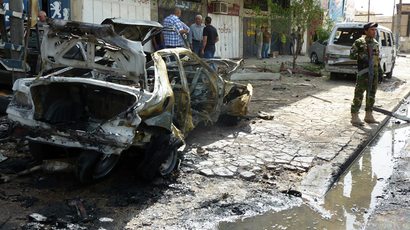1000+ killed: October Iraq’s deadliest month since 2008
Iraq has just experienced its deadliest month in five years with over 1,000 killed amid spiraling violence, a topic that will rank high in talks between Iraqi Prime Minister Nouri al-Maliki and President Barack Obama in Washington on Friday.
The spike in deaths for October has created an atmosphere of anxiety and fear amongst the population since most of last month’s victims were civilians, according to government figures.
A total of 855 civilians, 65 policemen and 44 soldiers were killed, according to information from the Iraqi ministries of health, interior and defense, released on Friday.
According to data gathered by iraqbodycount.org, an independent organization that tracks the death toll in the country, the preliminary death toll in Iraq for October is 1,095 - the highest since April 2008, when 1,273 people were killed.
Of the 1,600 people who sustained injuries, 1,445 were civilians, while just 67 were soldiers, and 88 policemen. The data also showed that 33 fighters were killed and 167 arrested.
The grim data was released as Iraqi Prime Minister Nouri al-Maliki is in Washington for a meeting with President Barack Obama on Friday. The two leaders are expected to discuss the disturbing spike in Iraqi violence during his White House visit.
Despite heightened security measures being enforced nationwide, Iraq has failed to escape the clutches of a deadly cycle of violence that has left many people – witnesses as they were to years of bloodshed that followed the 2003 invasion and subsequent occupation of the country by the US military – desperate for a return to normalcy.
Violence in Iraq has been on the rise since April, when security forces initiated a deadly crackdown on Sunni protesters, many of whom believe they are being discriminated against by Prime Minister Nuri al-Maliki's Shi'ite-led government.
Iraqi officials have attempted to thwart the rise in car bombings and suicide attacks by various means, including floating helium balloons, equipped with security surveillance cameras high above Baghdad, and by setting up hundreds of police checkpoints around the country. Thus far, such efforts have been mostly ineffective.
At the same time, identifying the perpetrators - Sunni, Shiite, Al-Qaeda or other - has proven a challenge since it is rare for any group to claim responsibility for attacks.
"We know we have major challenges of our own capabilities being up to the standard. They currently are not," Lukman Faily, the Iraqi ambassador to the US, told AP this week. "We need to gear up, to deal with that threat more seriously. We need support and we need help."
Faily emphasized, however, that the Iraqi people are not interested in US forces on the ground once again in the war-torn country.
"We have said to the Americans we'd be more than happy to discuss all the options, short of boots on the ground."
But Shwan Zulal, an Iraqi and Kurdistan political analyst, said that by acquiring more military capability the Iraqi government will not solve the country’s terrible problems.
“Maliki feels he needs to consolidate his power and he needs
to arm his army to make him stronger and have a more centralized
government within Iraq, because he feels that way he can counter
terrorism, but the reality is that the politics in Iraq is
broken,” he told RT.
“The violence as a result of that, it’s not only because the
army is weak but because Iraqi politics as a whole is
dysfunctional and hasn’t worked for the last ten years,” He
added.
In October 2011, al-Maliki's government refused to allow US forces to remain in Iraq with legal immunity after the nine-year war formally came to a close.
Nearly 4,500 American troops were killed in Iraq between the 2003 invasion and the 2011 pullout. More than 100,000 Iraqis were killed in the same period.














